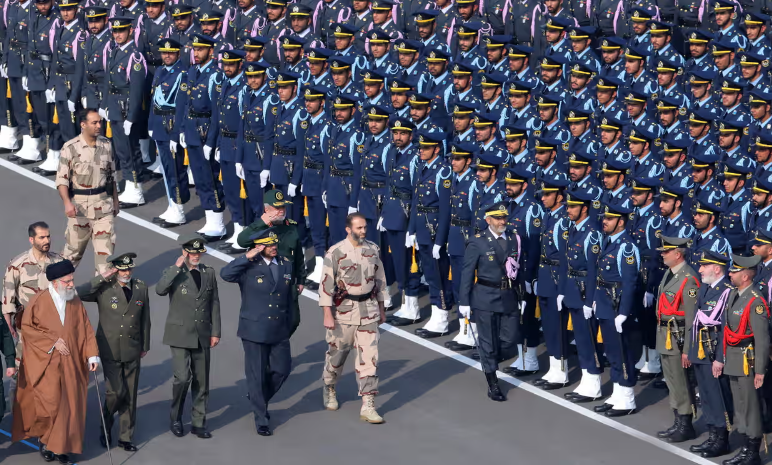According to The Guardian, Iran emerges as a major player in the Middle East, while the United States no longer holds its previous dominant position.
According to a report by The Guardian, which underscores the diminishing influence of the United States in the region, Iran has now emerged as the predominant power in the Middle East, backed by its allies, Russia and China.
The Guardian, in a detailed report, considers the recent air strikes by the United States and the United Kingdom against Yemen as another discouraging sign in the chain of unsuccessful Western policies in the Middle East. It states that with the gradual fading of Washington's influence in the Middle East, Iran has now become the primary power in the region.
According to The Guardian, a prominent link in the chain of Western failures in the Middle East is still the decades-long inability of the West to address the issue of Palestine. The fact that the United States, with the support of the United Kingdom, attacked Yemeni forces highlights the bitter truth that "Washington's political leverage is declining, its diplomacy is ineffective, and its power is scorned."
The dominant power in the Middle East is not the United States, the Westernized Egypt, Saudi Arabia, or even the Zionist regime of Israel. Instead, Iran, the primary ally of Yemen, has taken up this position.
Following the devastating massacre in Gaza that prompted a response from Yemen, analyzing the outcomes of this seemingly superficial war raises concerns. Nevertheless, strategically, the victor in this crisis is evident; with each Palestinian casualty, every rocket launched by Hezbollah, every airstrike conducted by Syria and Iraq, and every Yemeni drone, Iran's influence is reinforced.
Joe Biden, the President of the United States, immediately declared unconditional support for the Zionist regime after the Al-Aqsa Storm on October 7th. He rejected the United Nations ceasefire proposals, making a hasty move that isolated Washington in the eyes of the world and most Americans. His policy in the Middle East appears outdated and unattainable. The United States has never been popular in the Arab world, and Arabs have always considered it a "necessary evil." This is no longer the case; now, Iran is in command.
The Zionist regime of Israel, too, experienced a strategic setback following October 7th, although its more rigid politicians have yet to respond. The alarming violence in Gaza has irrevocably shifted the global perception of Tel Aviv, as evident in unprecedented accusations of genocide brought against Israel in The Hague. Khalid bin Bandar Al Saud, Saudi Arabia's ambassador to London, stated that Israel should no longer be treated as a special case.
All these developments favor Iran. The Islamic Republic's foreign policy revolves around three primary objectives: Expelling the emblem of the 1979 revolution, denoting the United States, from the Middle East; upholding regional supremacy; and enhancing connections with its key allies, specifically Russia and China.
The Guardian asserts that while elements of the resistance axis in the region operate independently, Iran has apparently established a remotely controlled coalition to expel the United States. The bombardment of Yemen's positions, it argues, doesn't alter this reality but rather reinforces the narrative of Tehran's resistance axis against the West and Israel throughout the region.
In a strategic and astute move last year, Iran took concrete steps to mend strained relations with its rivals in the Persian Gulf. It initiated diplomatic efforts with Riyadh, with China playing a crucial mediating role. Beijing and Moscow stand out as Tehran's staunch allies. This, more than other factors, has reshaped Iran's trajectory, turning it into an undeniable force. Russia's intervention in Ukraine and the pre-war "Unlimited" cooperation agreement between China and Russia have served as catalysts for Iran's resurgence and its evolution into a regional power.
The conflict in Ukraine and its aftermath have reinforced the newly established conviction of Beijing and Moscow, pivoting around the decline of American hegemony post-Donald Trump's presidency. This perspective envisions the imminent collapse and substitution of the Washington-centric international order.
Over the course of more than a decade since the rise of Xi Jinping, China has engaged in competition and potentially supplanted its areas of influence previously dominated by the United States. This shift has been achieved through the establishment of geopolitical and economic networks. Iran holds a central role in Xi Jinping's initiatives. In 2021, Beijing and Tehran formalized a 25-year comprehensive investment agreement. Benefiting from Beijing's support, Tehran became a member of BRICS and the Shanghai Cooperation Organization.
In February, Xi Jinping communicated to his Iranian counterpart, Ebrahim Raisi, expressing that "China will back Iran's efforts against American unilateralism and aggression."
The Guardian, in its conclusion, stated that after 45 years of endeavor, Iran has ultimately emerged as a significant player in the region. Sanctions, isolation, and threats against Tehran have proven ineffective. The United States, the United Kingdom, and Israel are confronted with severe and formidable hostility, necessitating a compelling requirement for the adoption of a new diplomatic approach to prevent a more extensive conflict.



























